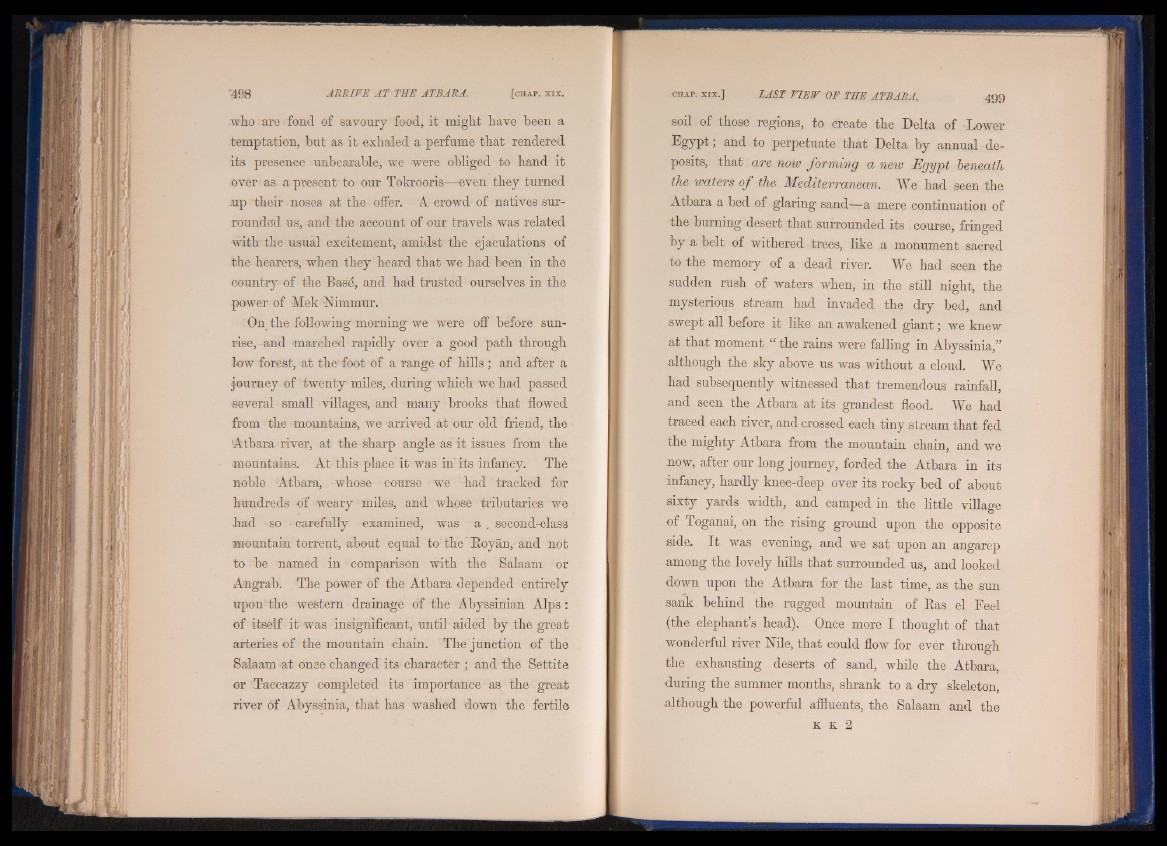
who are fond of savoury food, it might have been a
temptation, but as it exhaled a perfume that rendered
its presence unbearable, we were obliged to hand it
over t as a present to our Tokrooris—even they turned
up their noses at the offer. A crowd of natives surrounded
us, and the account of our travels was related
with the usual excitement, amidst the ejaculations of
the hearers, when they heard that we had been in the
country of the Basé, and had trusted ourselves in the
power of Mek Nimmur.
On the following morning we were off béfore sunrise,
and marched rapidly over a good path through
-low forest, at the1 foot of a range of hills ; and after a
journey of twenty miles, during which we had passed
several small villages, and many brooks that flowed
from the mountains, we arrived ât our old friend,, the
'Atbara river, at the sharp angle as it issues from the
mountains. At this place it was in’its infancy. The
noble Atbara, whose course we had tracked for
hundreds of weary miles, and whose tributaries we
had so • carefully examined, was a , second-class
mountain torrent, about equal tothe Royàn, and not
to be named in comparison with the Salaam or
Angrab. . The power of the Atbara depended entirely
upon- the western drainage of the Abyssinian Alps :
of itself it was insignificant, until aided by the great
arteries of the mountain chain. The junction of the
Salaam -at once changed its character ; and the Settite
©r Taecazzy completed its importance as the great
river of Abyssinia, that has washed down the fertile
soil of those regions, to create the Delta of Lower
Egypt > and to perpetuate that Delta by annual deposits,
that are now forming anew Egypt beneath
the waters of the Mediterranean. We had seen the
Atbara a bed of glaring sand-—a mere continuation of
the burning desert that surrounded its course, fringed
by a belt of withered trees, like a monument sacred
to the memory of a dead river. We had seen the
sudden rush of waters when, in the still night, the
mysterious stream had invaded the dry bed, and
swept all before it like an awakened giant; we knew
at that moment “ the rains were falling in Abyssinia,”
although the sky above us was without a cloud. We
had subsequently witnessed that tremendous rainfall,
and seen the Atbara at its grandest flood. We had
traced each river, and crossed each tiny stream that fed
the mighty Atbara from the mountain chain, and we
now, after our long journey, forded the Atbara in its
infancy, hardly knee-deep over its rocky bed of about
sixty yards width, and camped in the little village
of Toganai, on the rising ground upon the opposite
side. It was evening, and we sat upon an angarep
among the lovely hills that surrounded us, and looked
down upon the Atbara for the last time, as the sun
sank behind the rugged mountain of Ras el Feel
(the elephant’s head). Once more I thought of that
wonderful river Nile, that could flow for ever througOh the exhausting deserts of sand, while the Atbara,
during the summer months, shrank to a dry skeleton,
although the powerful affluents, the Salaam and the
K K 2